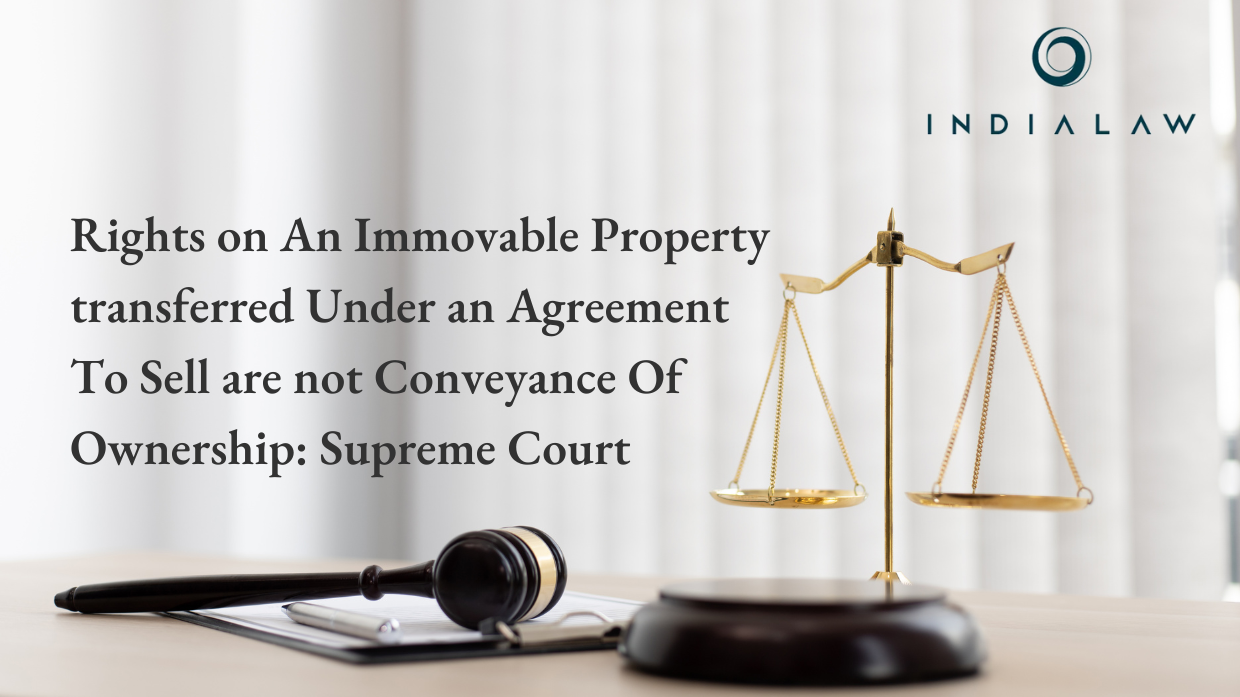Rights on An Immovable Property transferred Under an Agreement To Sell are not Conveyance Of Ownership: Supreme Court

In a recent judgment, passed in the matter of Munishamappa v.M.Rama Reddy and Ors.,[1]the Hon’ble Supreme Court (“SC”) clarified the fundamental principle of the conveyancing of immovable property, under section 54 of the Transfer of Property Act, 1882 (“TOPA”) which provides that a contract of sale of immovable property only indicates that sale shall take place on the terms settled between the parties and it does not of itself, create any interest, or charge on such property. In this matter, the execution of the Agreement to Sell was disputed in all the rounds of litigation.
The Appellants and Respondents, in this particular case, had entered into an Agreement to Sell dated 28th May, 1990 (“ATS”) in respect of a particular immovable property situate in Karnataka. The requisite consideration and deliverance of possession had been done prior to the execution of the aforementioned ATS. However, the ATS was never registered as the intention was to execute a registered sale deed in the future as per the terms of the ATS.
Section 5[2] of the Karnataka Prevention of Fragmentation andConsolidation of Holdings Act, 1996 (“Fragmentation Act”) provided for a bar on or the prevention of fragmentation of agricultural holdings and for their consolidation for these types of lands in the state of Karnataka. The execution of a registered sale deed, in this particular case, was never done due to the aforesaid bar by the Fragmentation Act. The ATS had been executed with the expectation that the Fragmentation Act would be repealed soon thereafter, which it was. However, the ATS never culminated into a registered sale deed post-repeal of the Fragmentation Act.
Accordingly, the Appellant issued a legal notice dated 3rd September 2001, to the Respondents seeking the execution of a registered sale deed, to no avail. Thereafter, a suit was instituted on 1st October 2001, seeking specific performance of the ATS and a direction to the Respondents to execute a registered sale deed. The suit was dismissed on the grounds of limitation. However, this dismissal was carried in appeal and set aside by the first appellate court. Thereby, the first appellate court also decreed the suit in favour of the Appellant, by holding that the execution of the ATS was proved successfully by the Appellant.
Thereafter, the Respondents carried the first appellate court’s decision in second appeal before the Hon’ble High Court of Karnataka (“HC”). The HC allowed the second appeal and held that the sale was barred due to being violative of the Fragmentation Act. In this context, the present appeal was preferred by the Appellant before the SC.
The SC firmly held that the ATS itself was not a conveyance, and in any case in the absence of any issue framed and given that neither party has pleaded any violation of section 5 of the Fragmentation Act, the HC fell in error in holding that the ATS was in violation of section 5 of the Fragmentation Act. Further, the SC reiterated that ATS is not a conveyance and hence it did not transfer ownership rights or confer any title. Thereby, the Fragmentation Act had no role to play. It was further observed that the Respondents had received the full consideration and transferred the possession of the property in question. Therefore, the decree passed by the first appellate court was upheld.
The aspect of sale being done through a registered instrument has been repeatedly observed by the SC, in a long line of decisions.[3]It has been observed, therein, that the provisions of the TOPA are mandatory in nature, and any sale of immovable property must be done via a registered deed/instrument only. The reasons for this are indicated hereinafter:
- Section 54[4] of the TOPA prescribes that a sale of an immovable property, when the value exceeds Rs. 100/- (Rupees One Hundred Only), shall only be done via registered instrument.
- Section 54 of TOPA further goes on to state that a contract for the sale of immovable property is only to record that a sale of such property shall take place on terms settled between the parties therein. It does not, of itself, create any interest in or charge on such property. The same is also highlighted above.
- Section 53A[5] of the TOPA, which speaks of part performance in relation to various types of transfers, provides for the protection of the rights of a transferee when part performance has occurred, and possession of the immovable property has been delivered to the transferee. Thereby, the transferor is barred from proceeding against the transferee in respect of the rights in relation to the property, save what is provided for in the agreement between the parties.
- Section 17[6] of the Registration Act, 1908 (“Registration Act”)inter alia prescribes mandatory registration of those instruments recording sales under section 54 as well as transfers via part performance under section 53A of the TOPA.
- Section 49[7] of the Registration Act prescribes that there will be no effect given to any document which is required to be mandatorily registered under section 17, unless registration is done of such document. Thereby, it also prescribes that there will be no evidence of or effect on the transfer of any immovable property, unless registration of the transfer document is done.
- Registration of such instruments, therefore, provide three specific utilities. Firstly, it acts as a record and recognition of the transfer for any interested stakeholder under law (i.e., the transferee and the transferor). Secondly, it also acts as evidence to the world at large that the immovable property has been transferred in the manner recorded by the registered instrument. Finally, any person interested in any immovable property may make enquiries as to the title directly from the register where the various instruments have been previously registered in regard to that property.
In the authors’ opinion, the judgement passed in the matter of Munishamappa(supra) revolves around the conveyance of immovable property under an unregistered and disputed Agreement to Sell. Pertinently, section 54 of TOPA also defines sale as transfer of ownership in exchange for a price paid or promised or part–paid and part-promised. It further provides that such transfer must take place only through a registered instrument. It would be interesting to know the repercussion (in the context of conveyancing) if any, on a registered, stamped Agreement to sell (Sale deed not executed separately) on which the stamp duty is already paid and parties are willing to perform their respective duties of payment along with handover of possession.
[1]Civil Appeal No. 10327 of 2011, order dated 2nd November, 2023. The bench comprised of Vikram Nath and Rajesh Bindal, JJ.
[2]Section 5 of the Karnataka Prevention of Fragmentation and Consolidation of Holdings Act, 1996 states thus:
“5: Sale, Lease, etc:
(1) (a) No person shall sell any fragment in respect of which a notice has been given under subsection (2) of Section 4, except in accordance with the provisions of clause (b).
(b) Subject to the provisions of Sections 39 and 80 of the Karnataka Land Reforms Act, 1961 (Karnataka Act 10 of 1962), whenever a fragment is proposed to be sold, the owner thereof shall sell it to the owner of a contiguous survey number or recognised sub-division of a survey number (hereinafter referred to as the contiguous owner). Is the fragment cannot be so sold to the contiguous owner, for any reason, the owner- of the fragment shall intimate in the prescribed form, the reasons therefore along with an affidavit in support thereof to the Tahsildar and also send copies of such intimation and affidavit to the Sub- registrar, in the prescribed manner and may thereafter sell such fragment to any other person.
(2) Notwithstanding anything contained in any law for the time being in force or in any instrument or agreement, no such fragment shall be leased to any person other than a person cultivating any land, which is contiguous to the fragment.
(3) No such fragment shall be sub-divided or partitioned.”
[3] See generally, Rambaran Prosad v. Ram Mohit Hazra [1967] 1 SCR 293; Narandas Karsondas v. S. A. Kamtam and Anr. (1977) 3 SCC 247; Rambhau Namdeo Gajre v. Naryan Bapuji Dhotra [2004 (8) SCC 614]; Suraj Lamp and Industries Pvt. Ltd. v. State of Haryana and Anr. – I [2009 (7) SCC 363]; and, Suraj Lamp and Industries Pvt. Ltd. v. State of Haryana and Anr. – II [(2012) 1 SCC 656].
[4] Section 54 of the Transfer of Property Act, 1882 states thus:
“54. “Sale” defined. — “Sale” is a transfer of ownership in exchange for a price paid or promised or part-paid and part-promised.
Sale how made. — Such transfer, in the case of tangible immovable property of the value of one hundred rupees and upwards, or in the case of a reversion or other intangible thing, can be made only by a registered instrument.In the case of tangible immovable property of a value less than one hundred rupees, such transfer may be made either by a registered instrument or by delivery of the property.Delivery of tangible immovable property takes place when the seller places the buyer, or such person as he directs, in possession of the property.
Contract for sale. —A contract for the sale of immovable property is a contract that a sale of such property shall take place on terms settled between the parties.It does not, of itself, create any interest in or charge on such property.”
[5] Section 53A of the Transfer of Property Act, 1882 states thus:
“53A. Part performance. — Where any person contracts to transfer for consideration any immovable property by writing signed by him or on his behalf from which the terms necessary to constitute the transfer can be ascertained with reasonable certainty:
and the transferee has, in part performance of the contract, taken possession of the property or any part thereof, or the transferee, being already in possession, continues in possession in part performance of the contract and has done some act in furtherance of the contract, and the transferee has performed or is willing to perform his part of the contract, then, notwithstanding that, where there is an instrument of transfer, that the transfer has not been completed in the manner prescribed therefor by the law for the time being in force, the transferor or any person claiming under him shall be debarred from enforcing against the transferee and persons claiming under him any right in respect of the property of which the transferee has taken or continued in possession, other than a right expressly provided by the terms of the contract:
Provided that nothing in this section shall affect the rights of a transferee for consideration who has no notice of the contract or of the part performance thereof.”
[6] The relevant portion of section 17 of the Registration Act, 1908 states thus:
“17. Documents of which registration is compulsory. — (1) The following documents shall be registered, if the property to which they relate is situate in a district in which, and if they have been executed on or after the date on which, Act No. XVI of 1864, or the Indian Registration Act, 1866, or the Indian Registration Act, 1871, or the Indian Registration Act, 1877, or this Act came or comes into force, namely: —…
(b) other non-testamentary instruments which purport or operate to create, declare, assign, limit or extinguish, whether in present or in future, any right, title or interest, whether vested or contingent, of the value of one hundred rupees and upwards, to or in immovable property;
(c) non-testamentary instruments which acknowledge the receipt or payment of any consideration on account of the creation, declaration, assignment, limitation or extinction of any such right, title or interest;…
(1A) The documents containing contracts to transfer for consideration, any immovable property for the purpose of section 53A of the Transfer of Property Act, 1882 (4 of 1882) shall be registered if they have been executed on or after the commencement of the Registration and Other Related laws (Amendment) Act, 2001 (48 of 2001) and if such documents are not registered on or after such commencement, then, they shall have no effect for the purposes of the said section 53A.…”
[7] Section 49 of the Registration Act, 1908 states thus:
“49. Effect of non-registration of documents required to be registered. — No document required by section 17 1 [or by any provision of the Transfer of Property Act, 1882 (4 of 1882)], to be registered shall—
(a) affect any immovable property comprised therein, or
(b) confer any power to adopt, or
(c) be received as evidence of any transaction affecting such property or conferring such power, unless it has been registered:
Provided that an unregistered document affecting immovable property and required by this Act or the Transfer of Property Act, 1882 (4 of 1882), to be registered may be received as evidence of a contract in a suit for specific performance under Chapter II of the Specific Relief Act, 1877 (3 of 1877) or as evidence of any collateral transaction not required to be effected by registered instrument.”
By entering the email address you agree to our Privacy Policy.



